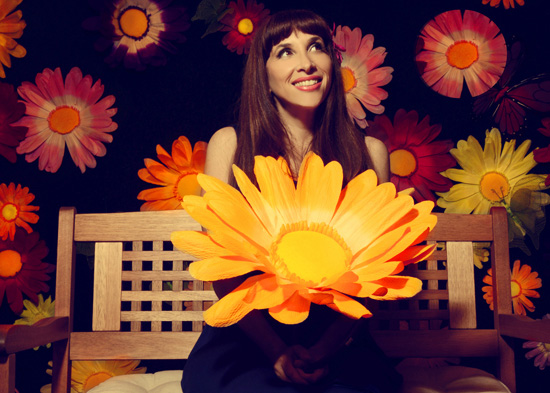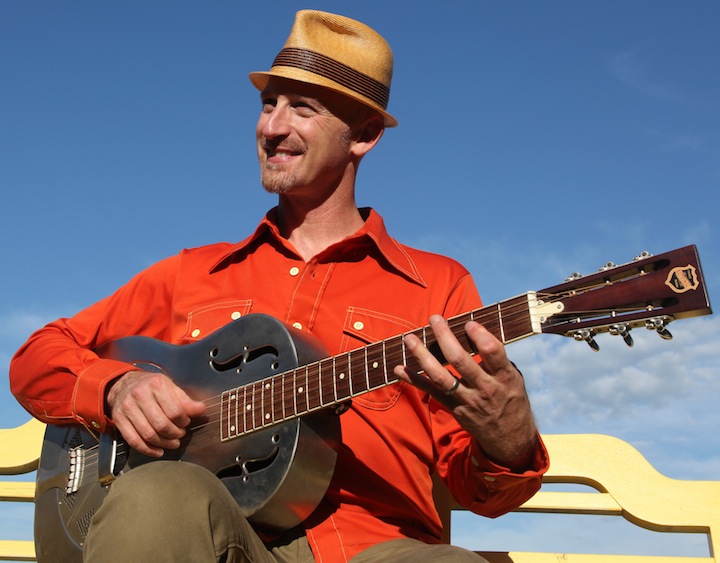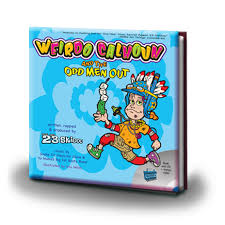Musician Bari Koral made her way to making music for kids and families the same way a lot of her compatriots did -- after getting burnt out making music for adults.
But as she's released four albums for families (the latest, The Apple Tree and the Honey Bee, came out earlier this summer), she's also been in the vanguard of folks who have focused on bringing yoga to families.
Koral and I chatted via e-mail recently and in the interview below, she discussed how her new album differed from her other recording experiences, how her first album came to be, and how she brought her yoga and musical lives together.
Zooglobble: What are your first musical memories?
Bari Koral: I remember listening to Thriller and the Grease Soundtrack pretty much on repeat when I was younger. I also remember being around 6 or 7 and being in camp and the counselors teaching us campers a new song. I seemed to get it before anyone else and I remember her saying “Now we know what Bari can do”
I never forgot that.
What led you into making music for kids?
I was burned out and totally exhausted from being on the road playing colleges and other places as an “adult” singer-songwriter. I was also broke and in debt. I had no idea what was next for me. The one thing I had was my niece. She was 5 and was a MAJOR light in my life. She was also deaf but got cochlear implants. Once she could start to hear around 4 she became a big music fan and she was especially obsessed with my adult song “Aspiring Angel” - which I have to say was one of my strongest songs I had ever penned up to that point.
I saw the sophistication of her taste and often thought about why she was so drawn to that particular song. Around this same time I saw Ralph’s World and was very impressed by the elegant simplicity of his songs, and the fact that the band rocked and there were no gimmicks other than great music.
I was also doing stuff on the side for Jim Packard at the Long Island Children’s Museum who suggested I take a real shot at writing songs for children. And finally, John Medeski, who is a friend, leant me the keys to his cabin in Woodstock. He had just gotten a kids record deal and he heard what I had written for the Children’s Museum and he said, “take these keys to the cabin and go write some songs.” And that is what I did. I thought of my niece Mikayla, at the time, pretty much my only influence and wrote almost our entire EP in one weekend which included “Nothing I Wouldn’t Do” and “A Day at the Beach.” Eight years later those are still two of our most beloved kids/family songs.
You've worked with a few different producers - what led you to go to Nashville to record The Apple Tree and the Honey Bee with Brad Jones?
Brad Jones is a great record maker and music maker. He’s old school. He digs in deep, he’s got such good ears. He’s got old Martin Guitars lying around, everywhere and tons of off beat instruments. He’s such a great player and he has worked with Josh Rouse, Over the Rhine and many others who are easily some of the best singer songwriters we have today. Singers and songwriters are drawn to Brad because he can steer the ship in the most melodic and luckiest of places. Plus as a band we all got to honker down in the studio for almost a full week which is a total luxury these days. It was really something to get to work with him - I’ve been a long time fan and he’s been a great friend for years.
What was challenging (or exciting) about working with Jones? Did knowing you were going to record in Nashville change your songwriting approach?
I already had the songs. I don’t record unless I have the material. I had just filmed 52 episodes of a TV show Yogapalooza with my bandmate Dred (air date to be announced) and I was totally exhausted. Brad said “you can relax and let me steer the ship. You can just lean back and sing and play." That was a VERY different approach to making an album. Usually you’re the ears of everything. But I trusted Brad, so I was able to give him the reins. That was a VERY new experience for me.
Sometimes you have to get out of the way to let in some magic, and also of course there are times when you have to put your foot down and say “no, that’s not me, that’s not my audience, next idea please.” And that happened too but pretty rarely. We were on the same page pretty much immediately. He’s been making albums for so many years, and now he has 2 young children so the timing was ideal for him too.
But we did get Dan Cohen on the album to add some kickin' country twang. That was real Nashville and so fun. I had already penned my Johnny Cash-ish "Big Truck" when we decided on Nashville.
Do you prefer writing songs or performing them?
That is a great question and I’m not sure. Sometimes I prefer writing, sometimes performing. It depends on the show and the experience! It’s amazing how quick the writing time is compared to all the other work such as playing, promoting, etc. I was just thinking about that today. I heard Elton John say he never spent more than 1 hour writing the music for any of those songs. Hard to believe how many hours he has spent playing the songs he wrote in under 1 hour.
A major part of your career involves yoga for kids -- how did that come about?
I got into yoga because I suffered from rather severe anxiety in my early 20’s. I really suffered. Right away the first doctor I saw wanted to prescribe medication. I had no tools whatsoever to help me but knew medication was not the answer. Finally someone told me about meditation and yoga. These and other tools I can only describe as lifesaving.
As I had already been practicing yoga for almost 20 years, I finally got certified to teach around the same time that I started writing music for children. For a long time I kept the music and the yoga more separate, I was the yoga teacher at JetBlue for example and I was so afraid they may Google me one day and see that I sang for children!
It took a lot of energy to keep both of my words apart. And then one day, it seems so obvious but I just decided to put everything together! Because that is what makes us unique - it’s our unique combinations of interests/talents/influences. When that all comes together- magical things can happen.
Is it easier to rouse a sleep audience of kids or to calm a hyper audience of kids?
For me it’s easier to calm down a hyper audience. I have lots of tools!
What's the thing you've made for families that you're most proud of?
Songs and records made with love.
What's next for you?
I’m playing the Newport Folk & Jazz Festival Family Show this [past] Wednesday! I cannot wait! [I'm] also playing the Monterey Jazz Festival and am the keynote for the first Kids Yoga Conference in DC. I’m really into getting more parents and teachers knowing about how our music works for kids yoga too, so that is a big part of what I’ve been doing. I hope the show airs soon and would love to do some Yogapalooza live shows with rockin’ music and some music, movement and kids yoga and bring it to a town near you! I also have a lot of concert tickets to sell to our shows this fall. And we recently bought a beautiful house on a 4 acre pond outside of Woodstock, NY and I’m into nesting at the house whenever possible and sharing it with family and friends.
Photo Credits: Shervin Lainez
























